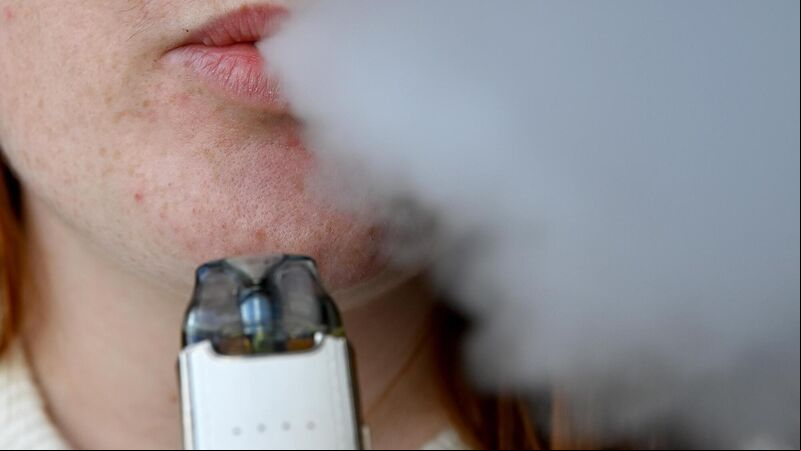Dr Michelle O'Driscoll: 'Vaping is far from harmless'

Although e-cigarette s avoid the well-documented toxins in traditional cigarettes, the long-term effects of the chemicals in vapes remain unclear. Picture: Eddie O'Hare

Although e-cigarette s avoid the well-documented toxins in traditional cigarettes, the long-term effects of the chemicals in vapes remain unclear. Picture: Eddie O'Hare
My first school research project was on smoking cessation when I was in fifth class of primary school.
I coming across a leaflet detailing the harms of cigarettes and carefully transcribing the list of ingredients, accompanied by examples of their other uses. Some of these substances were also found in tar, toilet cleaner, and weed killer.
It was a sobering discovery.
Today, we know that approximately 4,500 people die from tobacco smoking in Ireland every year, with nearly half of all smokers developing lung cancer in their lifetime.
The grim list of ingredients offers a clear explanation why.
Smoking cessation has been a priority for decades due to its significant health benefits - reducing lung cancer risk, improving cardiovascular health, and enhancing respiratory function.
However, quitting smoking is notoriously difficult because of nicotine, the highly addictive chemical in cigarettes.
Since my primary school project, the landscape has shifted with the advent of electronic cigarettes, or e-cigarettes.
These devices use a battery to heat nicotine, chemicals, and various flavorings to create an aerosol, which the inhales. This practice is commonly referred to as vaping.
When vaping first emerged, it was seen by some as an exciting innovation. Teenagers and even children began experimenting with it, along with adults who were trying to quit smoking but sought alternatives to traditional cigarettes.
The colourful packaging and fun flavours could be described as being particularly enticing to younger audiences.
Before long, vaping became a widespread social activity and daily habit.
Today, around one in five young people report vaping, making it a powerful gateway to nicotine addiction and, potentially, smoking.
Initially, legislation struggled to keep pace with the rapid rise of e-cigarettes, which fell into a regulatory grey area.
While traditional cigarettes were subject to strict laws - including an age restriction of 18 - vaping remained largely unregulated.
In recent years, new laws were introduced that banned the sale of e-cigarettes from vending machines, temporary or mobile premises, and at events where children were present.
Advertising was also prohibited on public transport, in cinemas, and near schools.
Despite these measures, a gap remains: while a license is required to sell tobacco products, no such requirement currently exists for nicotine-containing products like vapes. This is set to change in 2026 when licensing will be mandatory for both.
Although e-cigarette s avoid the well-documented toxins in traditional cigarettes, the long-term effects of the chemicals in vapes remain unclear.
Vaping may be less harmful than smoking, but it is far from harmless.
There are proven, thoroughly tested stop-smoking s and medications available, many of which are licensed for this purpose.
E-cigarettes, however, lack the rigorous evidence and testing required to their effectiveness as a smoking cessation tool.
The HSE currently does not recommend e-cigarettes for quitting smoking, as they may lead to dual use - combining smoking and vaping - which can make it even harder to quit nicotine altogether.
Seeking professional when attempting to quit nicotine is strongly advised.
There are various options available to manage cravings, increase ability, and provide encouragement.
Nicotine replacement therapy (NRT) products, such as gum, patches, and inhalers, are available from pharmacies. A pharmacist may ask about your daily cigarette consumption and when you typically crave your first cigarette to determine the best NRT option for you.
Additionally, prescription medications from your GP can complement NRT, offering a tailored approach to quitting.
These medications are often designed to ease cravings and may involve continued smoking or vaping during an initial period to allow the drug to take effect before quitting completely.
Vaping is a relatively new consideration in the context of health, and its risks are not yet fully understood.
What is clear is that vaping is addictive and not free from harmful substances.
While we await more comprehensive long-term data, the current advice is to avoid both cigarettes and e-cigarettes for better health outcomes.
Sign up to receive our weekly newsletter to be in with a chance to win prizes and see what's coming up in The Echo
one minute ago
Welsh farmer’s stag weekend in Cork cost him €9,500 after he assaulted man28 minutes ago
Jail for man who told Gardaí in Cork city that he was a former Manchester United player10 minutes ago
Golfer Adam Ahern banishes 2024 loss with Muskerry win46 seconds ago
Fire at Cork city recycling centre brought under controlHave you ed your FREE  App?
App?

It's all about Cork!
Add Echolive.ie to your home screen - easy access to Cork news, views, sport and more